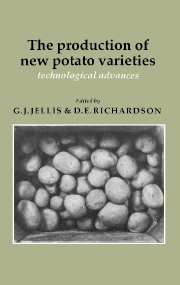Book contents
- Frontmatter
- Contents
- List of contributors
- Preface
- Editors' note and acknowledgements
- Introduction
- The development of potato varieties in Europe
- Genetic Resources
- Breeding Strategies
- Selection and Screening Methods
- Variety Assessment
- Semi-conventional Breeding Methods
- True Potato Seed
- Unconventional Breeding Methods
- Recent progress in molecular biology and its possible impact on potato breeding: an overview
- Combined application of classical and unconventional techniques in breeding for disease resistant potatoes
- Auther colture of dihaploid Solanum tuberosum H3 703
- Genetic manipulation in potato using Agrobacterium
- Prospects of using tumour-inducing plasmid-mediated gene transfer for the improvement of potato varieties
- Use of protoplast fusion and somaclonal variation in potato breeding
- The potential value of somaclonal variants in potato improvement
- Use of in vitro culture of Solanum tuberosum in potato breeding
- Commentary
- Index
Recent progress in molecular biology and its possible impact on potato breeding: an overview
Published online by Cambridge University Press: 05 March 2012
- Frontmatter
- Contents
- List of contributors
- Preface
- Editors' note and acknowledgements
- Introduction
- The development of potato varieties in Europe
- Genetic Resources
- Breeding Strategies
- Selection and Screening Methods
- Variety Assessment
- Semi-conventional Breeding Methods
- True Potato Seed
- Unconventional Breeding Methods
- Recent progress in molecular biology and its possible impact on potato breeding: an overview
- Combined application of classical and unconventional techniques in breeding for disease resistant potatoes
- Auther colture of dihaploid Solanum tuberosum H3 703
- Genetic manipulation in potato using Agrobacterium
- Prospects of using tumour-inducing plasmid-mediated gene transfer for the improvement of potato varieties
- Use of protoplast fusion and somaclonal variation in potato breeding
- The potential value of somaclonal variants in potato improvement
- Use of in vitro culture of Solanum tuberosum in potato breeding
- Commentary
- Index
Summary
Potatoes are now beginning to receive special attention from molecular biologists and tissue culture experts who are committed to introducing new genes from the test tube and establishing the principles of gene regulation. This is because the potato is one of the few crop species that is infected by Agrobacterium tumefaciens, the organism which can transfer new genes into chromosomes of many dicotyledonous species; plants can also be regenerated from the single cells that have received the new genes, although this latter property is still in need of considerable improvement for routine genetic engineering of the crop. The status of current research is covered by other contributions to this volume, in particular the papers by Ooms and Blau et al.
Potato breeders can be excited that their economically important crop has become the experimental organism of a new group of scientists eager to try out new techniques and ask fundamental questions on the frontiers of academic research. It is inescapable that potato breeding will be influenced by this research.
The introduction of new genes into potatoes is in its infancy but progress in learning how to do it will surely be rapid over the next few years because some of the knowledge (and many of the genes) being gained from studies on tobacco is transferable to potato.
- Type
- Chapter
- Information
- The Production of New Potato VarietiesTechnological Advances, pp. 272 - 276Publisher: Cambridge University PressPrint publication year: 1987
- 1
- Cited by



